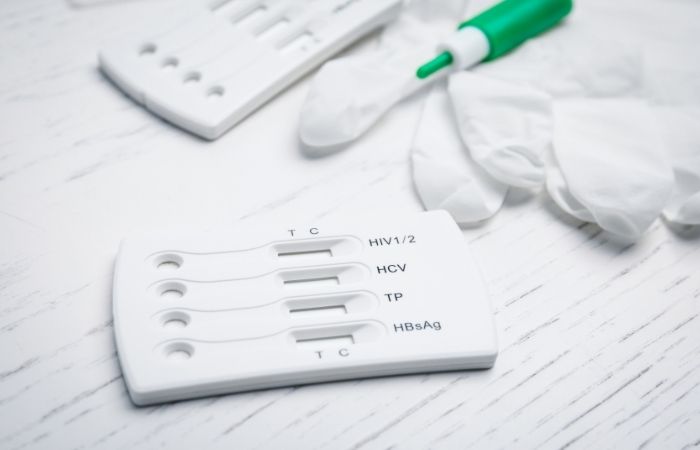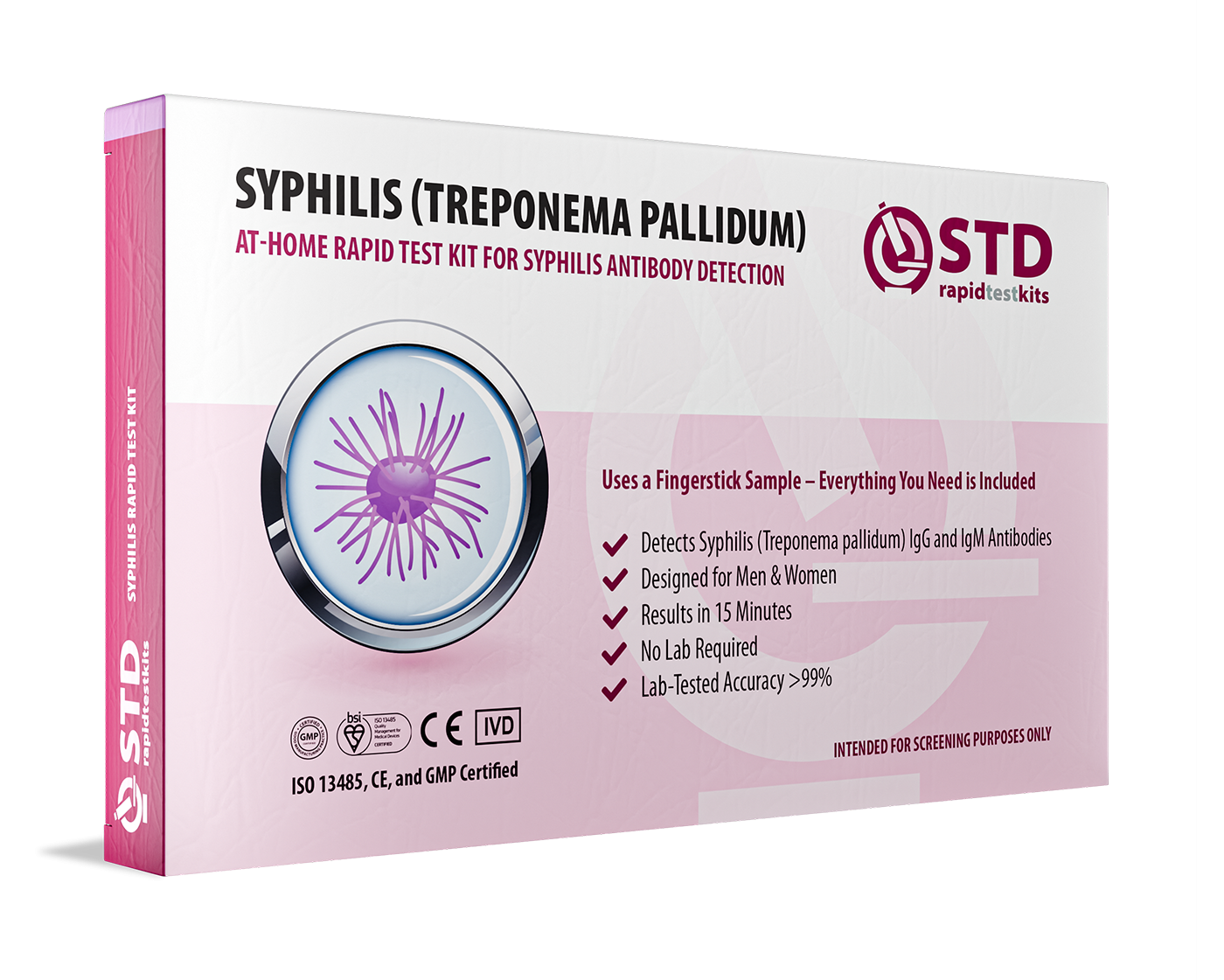Quick Answer: South Dakota has the highest congenital syphilis rate in the U.S. Early testing, including at-home syphilis tests, helps expecting mothers protect their babies.
In 2024, South Dakota quietly claimed a grim title: the nation’s leader in congenital syphilis cases. For expecting mothers, that means the risk isn’t a headline, it’s a shadow that follows every check-up. Congenital syphilis happens when an untreated infection passes from mother to baby, often silently, and can lead to miscarriage, stillbirth, or lifelong health challenges. It’s not a distant, urban problem; it’s showing up in rural clinics and small towns, in families who never imagined they’d be part of a statistic.
Why This Crisis Feels Different for Moms in South Dakota
In places like Sioux Falls or Pierre, some expecting moms can get same-day clinic appointments. But in the far-flung counties, winter roads and limited clinic hours turn a “simple” test into a half-day trip. Amanda, 22, lives on a reservation three hours from the nearest hospital. When she developed a mild rash and a nurse recommended another round of bloodwork, she hesitated.
“I didn’t feel sick. And I didn’t want to ask my boss for another day off just to maybe get bad news.”
This is where congenital syphilis becomes more than a medical issue, it becomes a logistical and emotional one. Delayed or skipped tests allow infections to linger, silently affecting pregnancies that could have been protected. And with South Dakota’s rates climbing, public health teams warn that every missed appointment is a risk for two lives, not one. At-home syphilis tests, FDA-approved and available online, are stepping in to close that gap. They turn a multi-hour journey into a 15-minute process at your kitchen table, with follow-up treatment available if needed.

People are also reading: Why Black Queer Men Still Face the Highest HIV Rates, And What’s Really Behind It
The Emotional Toll of Testing When You're Expecting
The science of syphilis is straightforward, detect, treat, confirm. But the human experience is messier. Many pregnant women quietly battle shame or fear alongside their medical concerns. After all, society still clings to the myth that STDs only happen to the “reckless.” Katie described her first home test as nerve-wracking but freeing: “I lit a candle, put on some music, and just got it over with. Waiting days for clinic results would have wrecked me.”
Stories like hers highlight that testing isn’t just about medicine, it’s about mental relief. Knowing your status early can replace weeks of anxious Googling with a concrete plan.
How Home Testing Fits Into Prenatal Care
For many expecting moms in South Dakota, prenatal care already feels like a maze of appointments, insurance calls, and icy drives to distant clinics. Adding repeat syphilis tests to that list can feel overwhelming. Yet home testing changes the rhythm entirely. It brings the clinic to the kitchen counter, letting women test at night after dinner or in the quiet of early morning before work. The small device in a plain box is discreet, and in that privacy, many women find their courage.
Lena, 24, described testing at home as a turning point in her pregnancy. “My partner and I opened the kit together. He read the instructions while I paced around the living room,” she says. “When the line showed up negative, I cried, not just out of relief, but because I felt like I finally had control.” Her experience mirrors what public health nurses have long emphasized: when testing is accessible, people test more often and intervene sooner, which can mean the difference between a healthy baby and a devastating outcome.
When Fear and Love Collide
Behind every home test or clinic visit is a tangle of emotions, love for the unborn child, fear of judgment, and the fragile hope that everything is okay. In rural South Dakota, some mothers admit they’ve delayed testing because they dreaded whispers in small-town waiting rooms. Others quietly order at-home syphilis test kits as an act of self-protection, guarding both their privacy and their peace of mind.
One couple in Pine Ridge shared their routine: after dinner on Sundays, they set up their home testing kit on the coffee table. The husband preps the swab while his wife hums along to the radio, pretending not to watch the timer tick. “It became our ritual,” he says. “We made it less scary by doing it together, and by the time our baby was born, we knew we had done everything we could.” That sense of shared responsibility transforms testing from a chore into a gesture of love, a quiet declaration that the baby’s safety matters more than the fear of stigma.
Check Your STD Status in Minutes
Test at Home with RemediumSyphilis Test Kit

 For Men & Women
For Men & Women Results in Minutes
Results in Minutes No Lab Needed
No Lab Needed Private & Discreet
Private & DiscreetOrder Now $33.99 $49.00
South Dakota’s Numbers Are a Wake-Up Call
The data is stark. State health reports show South Dakota now leads the nation in congenital syphilis cases, with rural and tribal communities carrying the heaviest burden. In some counties, rates have quadrupled in just two years. Public health teams say they’re racing to expand outreach, but gaps in transportation, clinic availability, and prenatal awareness make it hard to catch every case in time.
Every story behind those numbers is a mother, a family, and sometimes, a baby who didn’t get the chance to thrive. Health officials stress that prevention isn’t complicated: test early, treat if positive, and confirm the infection is gone before birth. Home testing is emerging as a bridge where clinics can’t always reach, especially in the bitter months when winter roads isolate entire communities.
From Anxiety to Action: Making Testing a Habit
Testing for syphilis during pregnancy isn’t a one-and-done event. Doctors often recommend repeat screenings, especially in high‑risk areas like South Dakota. That reality can feel exhausting for moms who already juggle morning sickness, long commutes, and the mental weight of “what if?” But when testing moves into the home, it stops feeling like a punishment and starts feeling like a ritual of self‑protection.
Marissa, 29, remembers her turning point vividly. After her first positive result early in her pregnancy, she spiraled into self‑blame. “I kept thinking, ‘How could this happen to me twice?’” she says. A home test kit changed that rhythm. Instead of waiting weeks for a clinic appointment, she could quietly retest after treatment, watch for that single reassuring line, and reclaim her sense of control. By the third trimester, she and her partner treated their Sunday evening tests like brushing their teeth, an act of love for the baby they hadn’t met yet.

People are also reading: Cold Sores and Kissing: What You Need to Know Before You Hook Up
The Power of Testing Together
Couples who study together often find a new level of closeness. Picture a living room in rural South Dakota with low light and snow tapping on the windows. As they wait for the test results, a woman who is going to be a mom leans against her partner's shoulder. Their hearts beat in time with each other. When the test comes back negative, the room feels like a warm light of relief. It's not just about not getting sick; it's also about being honest with each other and facing the unknown together.
Public health experts say this kind of proactive, shared approach can cut congenital syphilis rates dramatically. When testing is frequent, treatment is timely, and partners communicate openly, infections rarely reach the baby. The best part? Home testing breaks the cycle of delay and denial, replacing it with a small but powerful routine that keeps families safer.
Take Back Your Peace of Mind
Every expecting mother in South Dakota deserves to know she’s doing everything possible to protect her baby, even when clinics feel far away and the stigma feels closer than ever. At-home syphilis testing turns fear into knowledge, and knowledge into action. It’s a quiet, private step that can change the trajectory of an entire pregnancy.
Don’t wait and wonder. Make testing part of your self‑care routine. Order a reliable at‑home STD test kit today and give yourself and your baby the peace of mind you deserve.
When a Missed Test Changes Everything
Carla, 21, lives in a town so small that everyone waves when they pass on the only road in and out. During her second trimester, a nurse suggested an additional syphilis test, but the nearest clinic was ninety miles away, and her car’s check engine light had been on for weeks. She decided to wait until her next routine appointment. “I felt fine,” she recalls. “No fever, no rash, nothing to make me panic.” She spent the following weeks focused on baby names and repainting the nursery a soft yellow.
When she finally made it to the clinic, her test came back positive. The diagnosis stunned her. She had trusted the absence of symptoms, and now the doctor explained that the infection had likely been present long enough to put her baby at risk. The treatment worked, but the next months were shadowed by anxiety. She underwent extra ultrasounds and repeat tests, feeling a little jolt of guilt every time a nurse drew blood. “I kept thinking about those weeks I waited,” she says softly.
“I wish I’d had a way to test at home the moment the nurse suggested it.”
Carla’s story is a vivid reminder that congenital syphilis doesn’t wait for convenience. Many expecting mothers in South Dakota face similar barriers: long distances, unpredictable work schedules, winter storms that turn a simple checkup into a logistical challenge. Home testing won’t erase every obstacle, but it can turn a dangerous delay into a life-saving decision made at a kitchen table instead of a waiting room.
Check Your STD Status in Minutes
Test at Home with Remedium7-in-1 STD Test Kit

 For Men & Women
For Men & Women Results in Minutes
Results in Minutes No Lab Needed
No Lab Needed Private & Discreet
Private & DiscreetOrder Now $129.00 $343.00
For all 7 tests
Why South Dakota Faces the Highest Rates
To understand South Dakota’s surge in congenital syphilis, you have to see the geography and the gaps it creates. In the wide stretches between small towns, healthcare can feel like a distant luxury. Some counties have only one prenatal provider, and for tribal communities, the closest full-service hospital may require hours of travel. When every appointment means a tank of gas and time off work, testing becomes a question of feasibility, not just willingness.
Public health officials point to several overlapping factors: a national increase in syphilis cases, pandemic-era disruptions in routine care, and rural access challenges that amplify the risk. In South Dakota, a missed test or untreated partner can quietly escalate into a preventable case of congenital syphilis. Data from the CDC shows that states with more rural isolation often see delayed prenatal screening, and the state’s 2024 numbers reflect that pattern in stark detail.
Then there’s the human layer that statistics can’t capture. In small towns, the stigma around STDs still lingers like a cold draft through old windows. A pregnant woman might avoid a clinic visit because she dreads a familiar face in the waiting room or worries that word will travel before she’s ready to talk. When combined with long drives and unpredictable weather, stigma becomes another form of distance, one that keeps infections invisible until they reach the baby.
Home testing begins to close that gap. It removes the social spotlight and the travel time. It gives mothers and their partners the power to act without delay, without having to choose between privacy and safety. In a state where numbers have climbed to lead the nation, turning testing into a habit instead of a hurdle may be the most powerful tool South Dakota families have.
FAQs
1. Is it possible to stop congenital syphilis?
Yes. Early and repeated testing during pregnancy, along with prompt treatment if the test is positive, can almost always stop the baby from getting the disease. Home testing can help moms get this process going right away.
2. Is it safe to take a syphilis test at home while pregnant?
Yes. FDA-approved home tests are safe to use while pregnant and are a private way to check for syphilis between visits to the doctor.
3. How often should I get tested for syphilis while I'm pregnant?
Most doctors say you should get tested once in the first trimester and again in the third trimester. More tests may be needed in places with a lot of risk, like South Dakota.
4. What do I do if I test positive for syphilis at home?
If you get a positive home test, you should go to a clinic to confirm the results and get treatment. Penicillin shots work very well and are safe for pregnant women.
5. Is it possible for me to give my baby syphilis without knowing it?
Yes. Syphilis can be asymptomatic, so it's important to test newborns regularly and again to keep them from getting the disease at birth.
6. If I test positive, do I have to tell my partner?
It's important for partners to know because they may need to get tested and treated to keep from getting sick again and to keep the baby safe.
7. What is causing the rise in congenital syphilis in South Dakota?
Cases are on the rise because of gaps in rural healthcare, delays in prenatal care, and stigma. There is also a general rise in syphilis infections across the country.
8. Is a home test as accurate as a test at a clinic?
FDA-approved home tests are good for screening, but you should always see a doctor to confirm the results and get treatment.
9. What could happen if congenital syphilis isn't treated?
If you don't treat syphilis while you're pregnant, it can lead to miscarriage, stillbirth, or serious problems for the baby that will last their whole life.
10. How soon will I get the results of a home syphilis test?
Most quick home tests give results in 10 to 15 minutes, so you don't have to wait for a clinic call to find out what they are.
You Deserve Answers
Pregnancy is already a whirlwind of emotions. Add the shadow of congenital syphilis, and it can be overwhelming. But fear loses its grip when you have knowledge and a plan. Every at‑home test you take is an act of love for your baby, a quiet moment where you choose action over worry.
If you live in South Dakota, where congenital syphilis is at its peak, don’t wait for the perfect day to drive hours to a clinic. Give yourself and your baby the gift of certainty. Order a discreet at‑home syphilis and STD combo test today and take the first step toward a safer, calmer pregnancy.
Sources
1. CDC – 2023 Congenital Syphilis Ranking: South Dakota Tops the Nation
2. VA Sioux Falls – Syphilis Cases Surge in South Dakota: Historic Highs
4. South Dakota Searchlight – SD’s Congenital Syphilis Rate Hits 482 per 100,000 in 2023
5. Great Plains Tribal Health – Tribal & CDC Teams Launch Syphilis Response on Reservations
6. CDC PDF – Prenatal Syphilis Screening Laws & Guidelines (July 2024)










